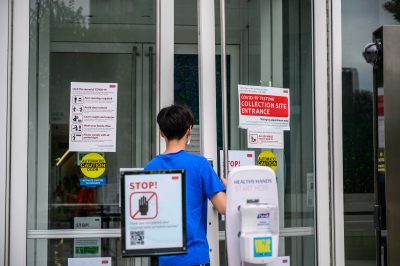
Any Boston University faculty, staff or student worker who has symptoms listed in the daily attestation survey should not report to work, and instead should contact their primary care provider, according to University guidelines.
Protocols call for them to then notify their supervisor and call the Healthway COVID-19 Medical Line.
BU spokesperson Colin Riley said the University is working to monitor cases at all times.
“The whole process of screening and testing is to identify,” Riley said, “so we’re able to limit and contain the spread.”
When a student worker tests positive, BU’s contact tracing team will contact them and ask whom they have had close contact with, Riley said. Then they will be placed into isolation housing.
A facilities team will also clean and sanitize all spaces the individual was in.
“We have several hundred quarantine beds and quarantine rooms,” Riley said. “By and large, they’re working well. We’ve already had people come out of isolation.”
He added that the number of positive cases the University has seen thus far is “low considering the population right now.”
If faculty who are teaching in person during the Fall test positive, Riley said the Office of the Provost will help to determine the correct course of action, whether it be remote teaching or acquiring a substitute instructor. Students will not be notified if their professor tests positive due to privacy reasons — unless the professor chooses to disclose the information.
“If you’re in the class,” Riley said, “you’ll either hear from the professor, or you’ll see that there’ll be a new person in there.”
He added that students should not assume that if a professor goes remote at some point that it is because they have COVID-19.
Riley said BU hopes to maintain a low rate of positive cases and that to accomplish this, every member of the community should follow social distancing guidelines and wear masks.
“While we’d love to see cases drop to zero,” Riley said, “for those who are positive, [we hope] that it runs its course, they’re able to stay healthy, get their meals and be able to participate in classes.”
Riley said each COVID-19 case is handled individually, and whether an area is sanitized depends on its proximity to the now-isolated student. If a student worker in the George Sherman Union tests positive, for example, the case will be analyzed accordingly, but facilities workers may not sanitize the entirety of the building.
College of Communication sophomore Evan Jimenez, a front-desk worker at the Track and Tennis Center, said he is worried about working this semester because he is unsure if he will be informed when a coworker tests positive for COVID-19.
“I have a degree of trust in the University that if something happens, they’ll isolate them quickly,” Jimenez said. “They’ll get in touch with me that I was in contact with them.”





























































































































